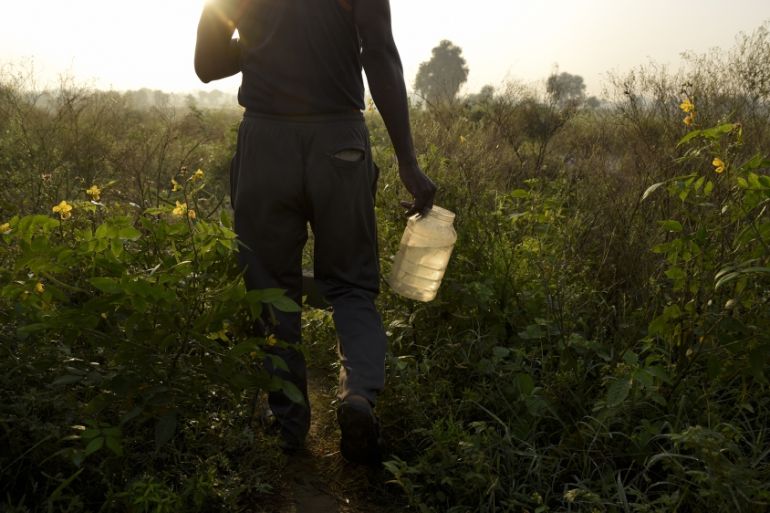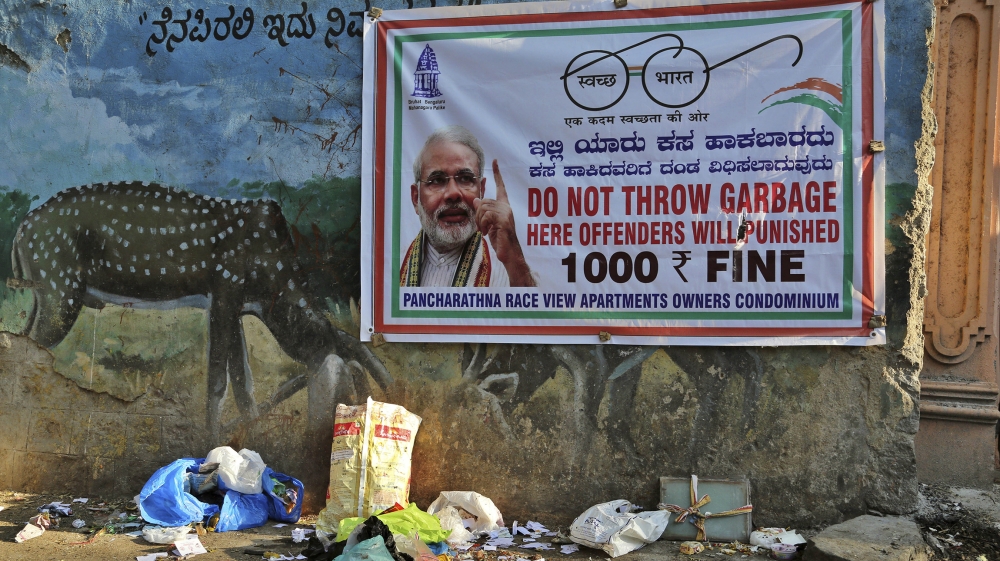Modi declares India open defecation free, claim questioned
PM Narendra Modi declares India ODF on Mahatma Gandhi’s 150th birth anniversary but experts remain sceptical.

New Delhi, India – Khatija, 40, a resident of JP Colony in New Delhi’s Rama Krishna Puram area walks half a mile (about 1km) every day to Nehru Ekta Colony to use a community toilet.
“There is not a single toilet in our colony,” she told Al Jazeera.
Keep reading
list of 4 itemsHere’s how to help earthquake-hit Morocco reduce the risk of disease
How much plastic is in our oceans?
Despair in Ettadhamen: The harsh reality of Tunisia’s economy
“Every day, there is a queue outside the toilet and people have to wait for their turns. Sometimes for more than half an hour,” Khatija said. “Those who are in an emergency defecate in open. What choice do we have?” she asked.
Wednesday marks 150 years of iconic Indian freedom fighter Mahatma Gandhi‘s birth, a day dedicated by the Indian government to its sanitation goals.
Five years ago, when Indian Prime Minister Narendra Modi launched the ambitious Swachh Bharat (Clean India) campaign, he had announced October 2, 2019, as the day India will be free of open defecation free (ODF) – a claim he made in a speech on Wednesday evening.
“In 60 months, 600 million people have been given access to toilets, more than 110 million toilets have been built. The whole world is amazed to hear this,” Modi told a crowd in Ahmedabad city.
Meanwhile, in Khatija’s neighbouring colony, things looked no different.
Dimple Peter, a local social worker, claimed that for a population of more than 800 people, there is just one community toilet with 10 latrines.
“The toilets are often stinky and dirty,” she told Al Jazeera. “Sometimes people think it is better to defecate in open as stinky toilets may lead to diseases.”
Residents said they are forced to defecate in the open as there are not enough community toilets to cater for a large number of people. They also said the toilets remain closed at night.
“The community toilets remain open from 5am till 9pm. Where will the people go during the night hours?” asked Ahsan-ud Din, 40, who runs a poultry shop.

ODF was the main objective of the Clean India campaign, which aimed to build 120 million toilets across the country by October 2, 2019.
Its other goals included cleaning up streets and other public infrastructure, achieving 100 percent door-to-door waste collection, building solid waste management plants in each town, and persuading Indians to adopt better sanitation practices.
“A clean India would be the best tribute India could pay to Mahatma Gandhi on his 150 birth anniversary in 2019,” Modi had said while launching the campaign in 2014.
The next five years saw numerous politicians, sportspersons and Bollywood stars participating in a government-sponsored publicity blitz to promote the Clean India campaign, involving millions of dollars.
Before Modi’s speech on Wednesday, the Indian government had already claimed constructing over 100 million of the 120 million toilets planned across the country.
Swachh Bharat Mission (Urban) director VK Jindal told Al Jazeera that toilets had been built in all urban centres and the target had been 100 percent achieved.
So why were people still defecating in the open in the national capital? Jindal blamed “the migrant population which does not stay permanently at one place”.
Last week, the Bill and Melinda Gates Foundation gave Modi the “Global Goalkeeper” award for the Clean India campaign and for publicising the benefits of sanitation and hygiene.
The New York-based foundation was widely criticised for its decision and one of its employees quit in protest.
Experts question claim
Hours after Modi received the award, two Dalit (former untouchables) children – Roshni Valmiki, 12, and her 10-year-old nephew, Avinash – were beaten to death in a village in central India’s Madhya Pradesh state for defecating in the open.
Avinash’s father Manoj Valmiki told Al Jazeera they lived in a small hut without a toilet.
Ironically, their village was declared ODF by the government in April last year.
Open defecation refers to the practice whereby people defecate in fields, bushes, forests, open bodies of water or other open spaces rather than using a toilet.
More than 300 million Indians were still defecating in the open in 2017, according to the World Bank.

Experts said that while the construction of toilets has increased, lack of water, poor maintenance and slow changes in behaviour have stood in the way of ending the practice.
The Research Institute for Compassionate Economics (RICE) surveyed 3,235 households in four north Indian states in 2014 and 2018.
Their research, released in January this year, found that open defecation had reduced by 26 percent since Clean India was launched and access to household toilets increased from 37 percent in 2014 to 71 percent in 2018.
However, the study found that 23 percent of people who owned a toilet continued to defecate in the open, including in Rajasthan and Madhya Pradesh states, which have been declared ODF.
“During our research, we saw people defecating in the open in villages that were otherwise declared ODF,” said Nazar Khalid, a research fellow at RICE.
“We also found latrine construction was often accomplished through coercion. People were told that if they did not build toilets, they will not get benefits under various government schemes,” he added.
Avani Kapur of the Centre for Policy Research (CPR) said it was too soon to declare India ODF as challenges remained on sustainable toilet technology, and safe cleaning and disposal of waste.
“We may lose momentum by calling ourselves completely ODF,” she said.
But the ruling Bharatiya Janata Party (BJP) claims the goals of the Clean India campaign have been “almost reached”.
“A huge behavioural change has been witnessed among people across India since the mission was launched,” BJP spokesman Shahnawaz Hussain told Al Jazeera.
“The mission has almost achieved its goal. We are close to the benchmark,” he said. “The dream of Mahatma Gandhi of a clean India is being fulfilled by Prime Minister Modi.”
Rejecting the BJP’s claims as “bogus”, Sanjay Nirupam of the opposition Congress party said people were defecating in the open even in cities such as Mumbai.
“This government is working only to create headlines,” he told Al Jazeera by telephone.
“The government should provide the facility to every household and we support the government in that. But to claim that everybody has got a toilet and nobody is going in the open is completely a bogus statement.”